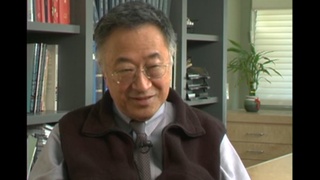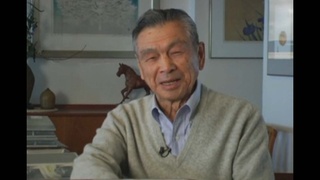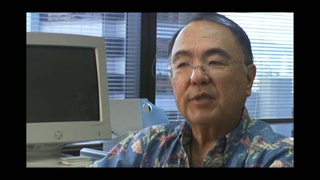Interviews
Interest in Japanese migration studies (Japanese)
(Japanese) Back then, in Japan, when we learned about America—for instance, when we learned about issues concerning black Americans, what I remember most is that we learned it in a way that assumed that white Americans were responsible for the tough circumstances faced by black American communities. But after coming to America, you find out that there are, in fact, some African Americans who are drinking alcohol in the middle of the day and not working at all. I sometimes pass by and see groups of these people hanging around together, and from this point of view, it makes me think that they’re a part of the problem as well.
Well, I was a student in the Fulbright Program (the US government's flagship program in international educational exchange), so everybody treated me well. But looking around me, there was this competitive immigration from Japan—the immigration right around the ‘60s—and they were settling around where I was. Well, I lived in the east so there were very few of them. But anyway, when I looked at them, even from the perspective of a student, I could see that it was a very difficult thing to be able to settle down in the States, to compete—compete against the American people, and to make their way into the center of American society. So yeah, I’m over here, really having it easy, while I felt that those who left their homes behind and took a risk to come here were having a pretty rough time.
So at that moment, I kind of felt that—and this relates to what I mentioned earlier about the black Americans—when you think about those who immigrated from Japan, or from any other country, I wondered whether we can truly call this country a “country for immigrants,” or a “country of equality,” or a “free country.” You’ve really got to see things from both sides. What I was learning [about America] when I was in Japan wasn’t completely true, and even after coming to America, even though I’m a Japanese immigrant as well, the experiences that I’ve had might be totally different from the experiences of another Japanese immigrant. Looking at all of these differences from many different angles was something that definitely triggered my interest.
Date: October 7, 2005
Location: California, US
Interviewer: Ann Kaneko
Contributed by: Watase Media Arts Center, Japanese American National Museum
Explore More Videos

His experiences in Chicago after WWII
(b.1929) Pioneer medical researcher in tissue transfer and organ transplantation.






Less information about Hawai‘i in mainland
(b.1944) Founder of Kobayashi Group, LLC

A teenager's memories of how a local newspaper misrepresented Japanese Americans
(b. 1925) Draft resister

The role of the media in influencing people's opinions
(b. 1925) Draft resister

Reaction to a 1942 speech by Mike Masaoka, Japanese American Citizen League's National Secretary
(1915 - 2011) Nisei florist who resettled in New York City after WW II. Active in Japanese American civil rights movement

First learning about the incarceration experience in college
(b. 1955) Lawyer

Feeling angry upon reading of Supreme Court case, 'Korematsu v. United States'
(b. 1955) Lawyer

Reasons for conformity and competitiveness in Gardena, California
(b. 1946) Lawyer


Japanese American railroad workers are fired following the bombing of Pearl Harbor
(b. 1923) Chick sexer
